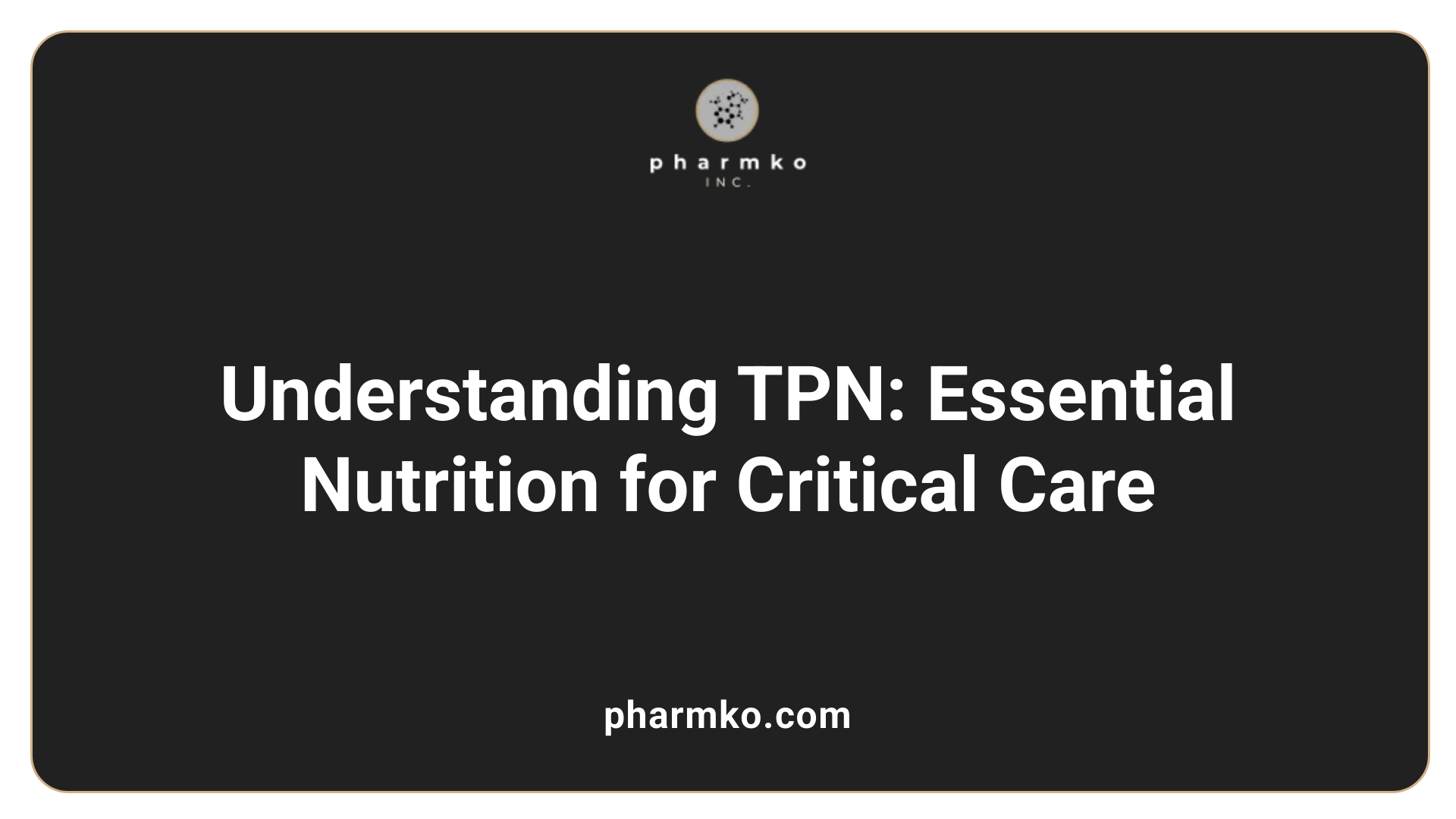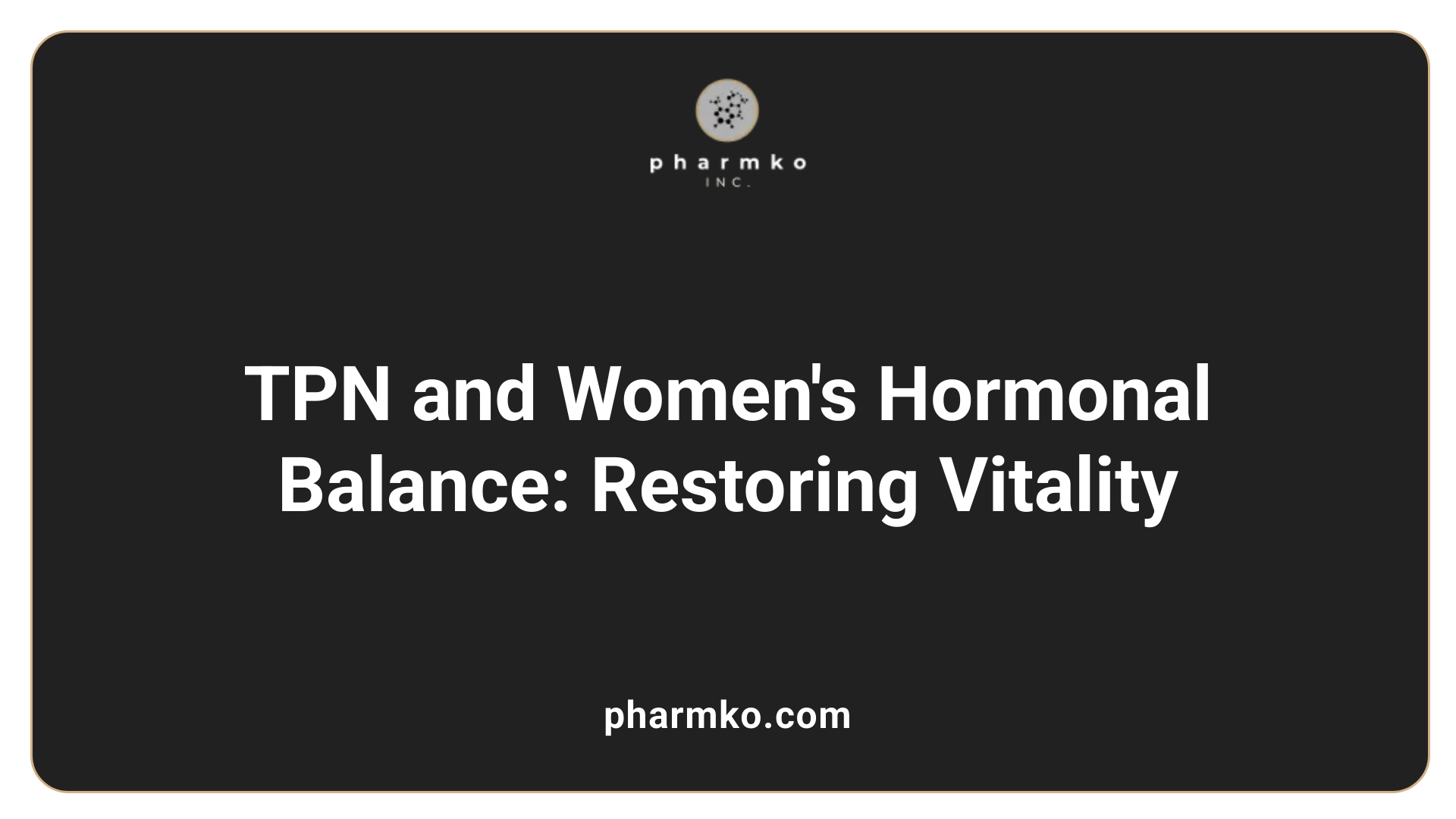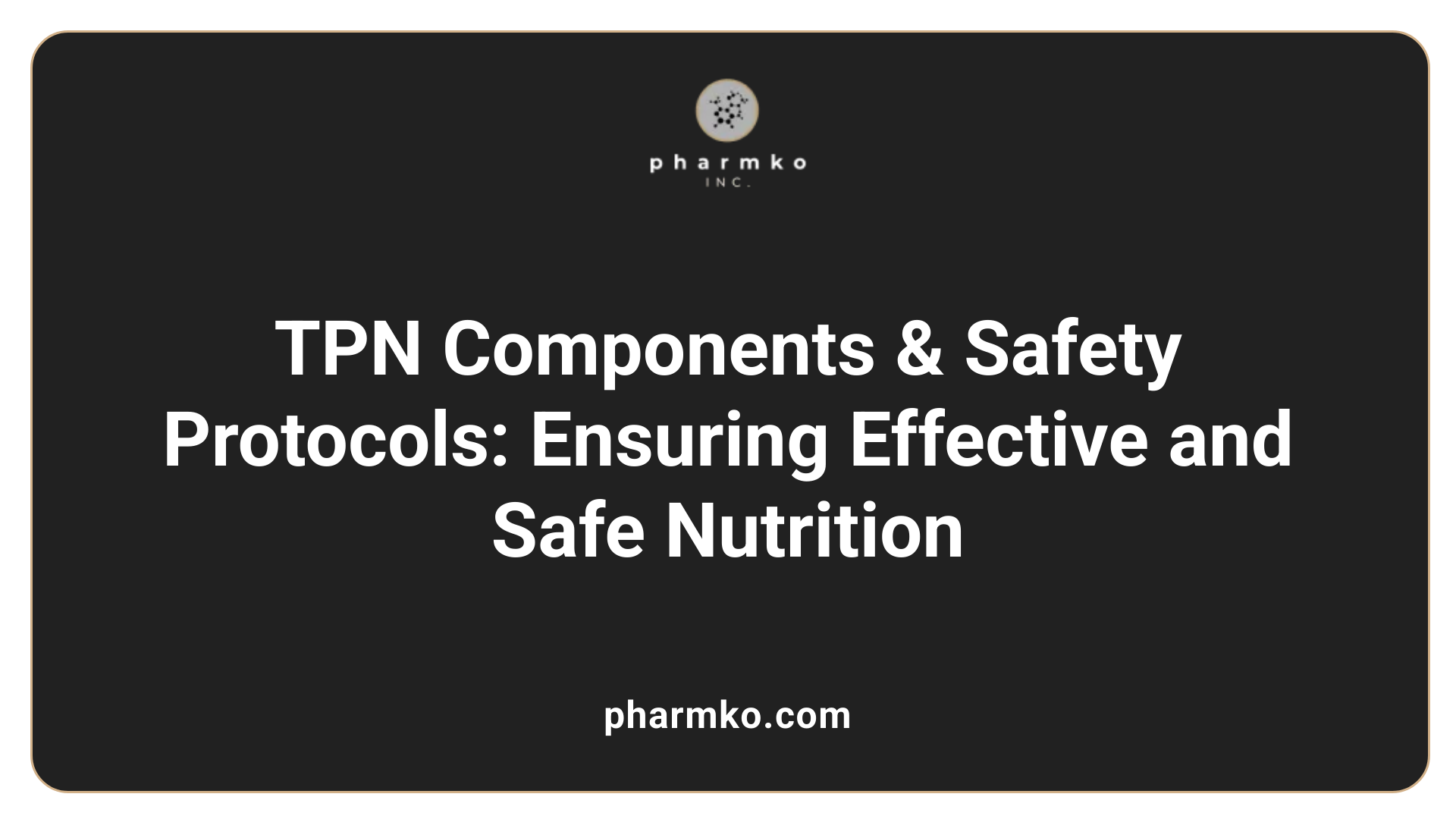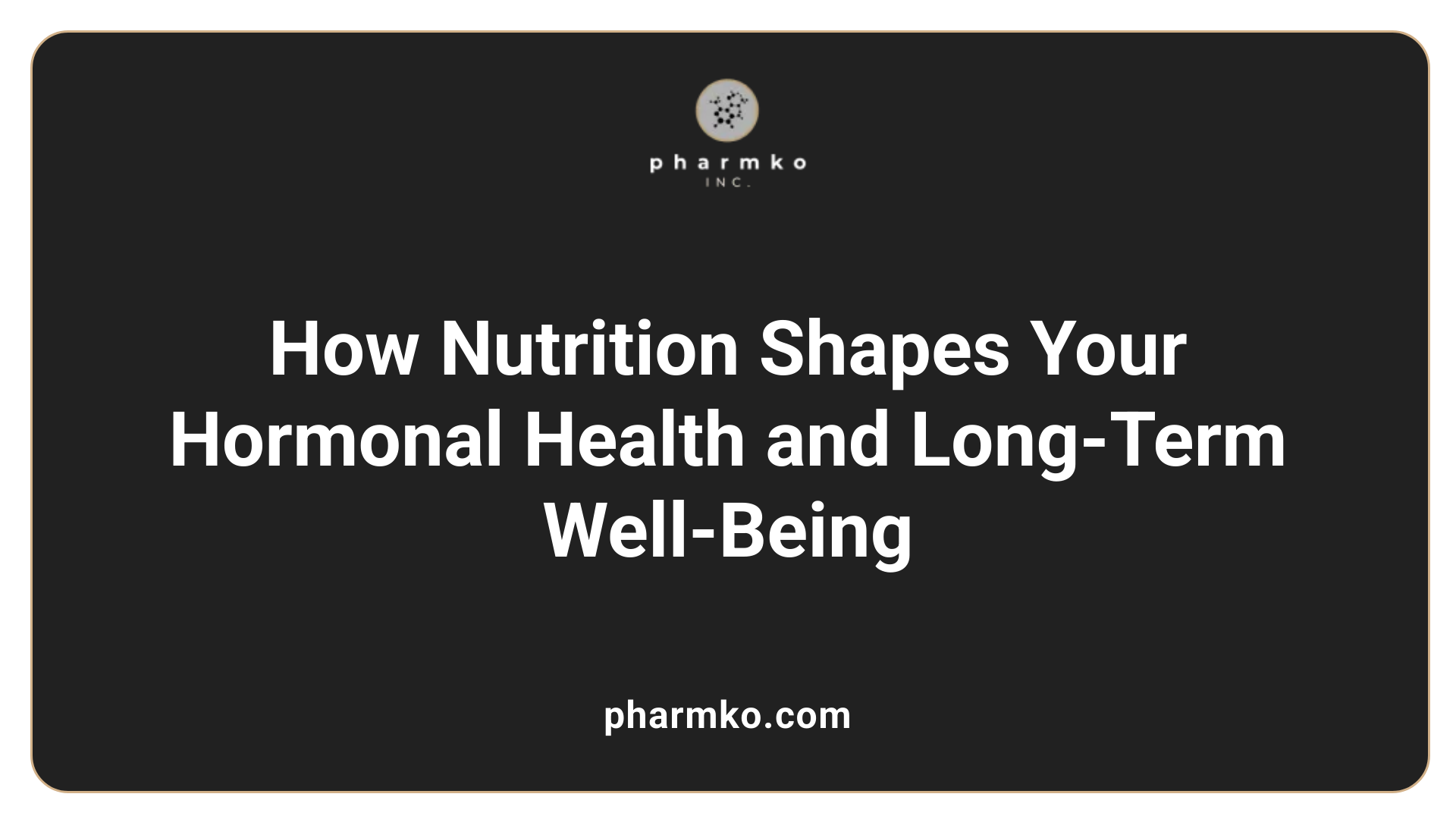The Benefits of TPN for Women with Hormonal Imbalances
Understanding the Role of Nutrition in Hormonal Balance for Women
Hormonal imbalances in women can significantly impact overall health and well-being, influencing mood, metabolism, reproductive health, and more. While lifestyle and medical treatments are vital, nutritional approaches play a fundamental role in supporting hormonal health. Among these, Total Parenteral Nutrition (TPN) emerges as a critical intervention for women unable to meet their nutritional needs orally or through enteral feeding. This article explores how TPN can be leveraged to improve hormonal balance, address deficiencies, and promote overall health in women facing hormonal challenges.
The Fundamentals of TPN and Its General Benefits

What is Total Parenteral Nutrition (TPN) and How Is It Administered?
Total Parenteral Nutrition (TPN) is a method of feeding that bypasses the gastrointestinal tract entirely. It involves delivering a specially formulated mixture of nutrients directly into a patient's bloodstream via a central venous line. This approach is critical for individuals whose digestive systems cannot absorb or tolerate food properly.
TPN is achieved using an intravenous (IV) line, often inserted into a large vein in the chest or arm. This method ensures the rapid and efficient delivery of nutrients directly into circulation, bypassing the stomach and intestines.
What Nutritional Components Are Included in TPN?
The TPN solution is carefully balanced to include various essential nutrients:
| Nutrient Type | Function | Additional Details |
|---|---|---|
| Dextrose (Carbohydrates) | Primary energy source | Supplies calories needed for daily activities and bodily functions |
| Lipids (Fats) | Energy, cell structures, hormone synthesis | Rich in essential fatty acids and organ protection |
| Proteins (Amino acids) | Tissue repair, enzyme production | Supports immune function and muscle maintenance |
| Vitamins & Minerals | Metabolism and overall health | Includes electrolytes, trace elements, and vitamins like B6, B9, B12, vitamin C, and E |
| Electrolytes & Trace Elements | Cellular functions and fluid balance | Ensures proper nerve and muscle functions |
This carefully tailored mixture helps meet the individual nutritional needs of patients, especially those unable to eat or digest food normally.
How Does TPN Help Patients Who Cannot Eat or Absorb Nutrients?
TPN effectively supports patients with severe GI conditions, malnutrition, or those undergoing treatments like chemotherapy. It ensures they receive vital nutrients necessary for healing, growth, and maintaining bodily functions.
Patients with conditions like Crohn’s disease, short bowel syndrome, or following extensive bowel surgeries often cannot absorb nutrients through their digestive system. TPN provides an alternative route to deliver calories, vitamins, and minerals directly into the bloodstream.
In addition, TPN can be life-saving for premature infants with immature digestive organs and for critically ill patients in hospitals. It allows healthcare providers to precisely control nutrient intake, reducing the risk of deficiencies or imbalances.
Who Is Most Likely to Benefit from TPN?
Individuals most likely to benefit include those with:
- Short bowel syndrome or extensive bowel resections
- Crohn’s disease during flare-ups
- Malnutrition or inability to absorb nutrients
- Extensive GI surgeries
- Undergoing chemotherapy
- Premature infants with immature digestive systems
While TPN is highly effective, it requires careful monitoring to minimize potential risks like infections, electrolyte imbalances, or liver complications.
| Benefit Aspect | Explanation | Practical Impact |
|---|---|---|
| Energy provision | Supplies calories and nutrients directly | Maintains energy levels when digestion is impaired |
| Nutritional support | Delivers balanced nutrients | Promotes tissue repair, immunity, and recovery |
| Customization | Adjusted to individual needs | Enhances safety and effectiveness |
| Life-saving potential | Critical for severe cases | Extends survival and improves quality of life |
Understanding how TPN operates and its applications helps in managing complex nutritional needs, ensuring patients receive proper nourishment even when oral intake isn’t an option.
TPN’s Role in Supporting and Restoring Hormonal Health in Women

How do nutritional deficiencies influence hormonal production and regulation?
Nutritional deficiencies can significantly impact the body’s ability to produce and regulate hormones properly. Key nutrients such as iodine, selenium, and iron are essential for healthy thyroid function, influencing hormones like thyroxine (T4) and triiodothyronine (T3). A lack of these nutrients can lead to hypothyroidism, which affects metabolism, energy, and overall hormonal balance.
Moreover, a well-balanced intake of healthy fats, vitamins, and minerals supports the synthesis of steroid hormones, including estrogen, progesterone, and testosterone. Deficiencies in these nutrients can disrupt hormone levels, potentially leading to issues such as estrogen dominance or irregular menstrual cycles.
Why are healthy fats, vitamins, and minerals important for hormone synthesis?
Healthy fats, including omega-3 fatty acids found in fatty fish, nuts, and seeds, serve as building blocks for hormone production. They are critical for synthesizing estrogen, progesterone, and testosterone, all of which influence reproductive health and mood.
Vitamins like B6, B9 (folate), B12, and antioxidants such as vitamins C and E, support hormone detoxification, adrenal health, and protect endocrine glands from oxidative stress. Minerals like magnesium are vital for cortisol regulation and thyroid activity, ensuring a balanced hormonal environment.
How does TPN affect conditions like estrogen dominance, PMS, and hormonal imbalance?
Total Parenteral Nutrition (TPN) can be instrumental in managing hormonal imbalances caused by nutritional deficiencies. By providing precise quantities of essential nutrients directly into the bloodstream, TPN helps correct deficiencies in key vitamins, minerals, and fatty acids.
This targeted nutritional support can reduce inflammation, promote hormone synthesis, and enhance tissue sensitivity to hormones, which are often compromised in conditions like estrogen dominance or PMS. Proper nutrition through TPN encourages the detoxification of excess hormones and restores a hormonal equilibrium, alleviating symptoms and improving overall endocrine health.
The ability to tailor TPN formulations means that healthcare providers can address individual nutritional gaps, supporting hormone regulation and contributing to better management of hormonal disorders.
| Nutrients | Role in Hormonal Health | Examples of Food Sources / Supplementation |
|---|---|---|
| Healthy Fats | Hormone synthesis, reducing inflammation | Avocados, olive oil, fatty fish, nuts, seeds |
| Vitamins B6, B9, B12 | Hormone detoxification, adrenal, and thyroid support | Leafy greens, legumes, eggs, fish, fortified cereals |
| Magnesium | Cortisol regulation, thyroid function | Leafy greens, nuts, seeds, whole grains |
| Iodine & Selenium | Thyroid hormone production | Seafood, Brazil nuts, iodized salt |
| Antioxidants (Vitamins C, E) | Protect endocrine glands from oxidative stress | Citrus fruits, nuts, seeds, green vegetables |
Understanding the role of nutrition in hormonal health highlights the importance of maintaining a balanced diet. When nutritional deficits threaten this balance, TPN offers a controlled means of restoring essential nutrients, thus supporting hormonal stability and overall well-being.
Components of TPN and Safety Protocols to Ensure Efficacy and Safety
 Total Parenteral Nutrition (TPN) is an advanced nutritional therapy used for patients who cannot eat or absorb nutrients orally or via enteral feeding. It involves delivering essential nutrients directly into the bloodstream through a central venous catheter. Ensuring its safety and efficacy requires understanding its core components and implementing strict safety measures.
Total Parenteral Nutrition (TPN) is an advanced nutritional therapy used for patients who cannot eat or absorb nutrients orally or via enteral feeding. It involves delivering essential nutrients directly into the bloodstream through a central venous catheter. Ensuring its safety and efficacy requires understanding its core components and implementing strict safety measures.
The essential components in TPN
TPN formulations typically include the following key nutrients:
- Carbohydrates: Mainly dextrose, providing energy.
- Proteins: Delivered as amino acids to support tissue repair and growth.
- Fats: Lipid emulsions supplying essential fatty acids and calories.
- Vitamins and Minerals: Including a broad spectrum of vitamins and trace elements like zinc, manganese, and copper.
- Electrolytes: Potassium, sodium, chloride, calcium, magnesium, and phosphate to maintain fluid and electrolyte balance.
- Water: To meet overall hydration needs.
These components are carefully combined and customized based on the patient’s age, weight, medical condition, and specific nutritional requirements.
Customization based on individual needs
Health care providers tailor TPN formulations to ensure proper nutrient ratios, especially for patients with specific metabolic or organ challenges. For example, patients with liver disease may require adjustments in lipid content, while those with renal issues might need modified electrolyte levels. The goal is to replicate as closely as possible the patient’s ideal nutritional profile.
Monitoring for complications
While TPN is life-saving, it requires vigilant monitoring to prevent and address potential issues:
- Infections: Strict aseptic techniques during preparation and administration are crucial to prevent bloodstream infections.
- Electrolyte Imbalances: Regular blood tests help detect abnormalities such as hypokalemia or hyperglycemia, allowing timely adjustments.
- Hepatic Issues: Long-term TPN use can impair liver function; therefore, liver enzymes are monitored routinely.
- Metabolic Risks: Hyperglycemia and refeeding syndrome are risks that necessitate close assessment and adjustment of nutrient infusion rates.
Effective management involves a multidisciplinary team including physicians, dietitians, and nurses working together to optimize nutritional intake and minimize complications.
| Core Components | Function | Additional Details |
|---|---|---|
| Carbohydrates (Dextrose) | Energy provision | Critical for metabolic functions |
| Amino Acids | Protein synthesis | Supports tissue repair and immune function |
| Lipid Emulsions | Essential fatty acids | Calorie-dense, assists in hormone production |
| Vitamins & Minerals | Cofactors in metabolic processes | Tailored to individual needs |
| Electrolytes | Fluid and mineral balance | Monitored closely to prevent imbalances |
Connection Between Nutrition, Hormonal Balance, and TPN
Nutrition directly influences hormonal health by regulating hormone levels and tissue responsiveness. TPN, by delivering essential nutrients directly into the bloodstream, supports the body's hormonal responses, including insulin stabilization, cortisol regulation, and growth hormone activity. Proper TPN management restores and maintains hormonal balance, supporting overall metabolic health and tissue function.
In essence, effective TPN use ensures that nutritional needs are met to promote hormonal stability, which is vital for healing, growth, and preventing metabolic disorders.
Linking Nutrition, Hormonal Balance, and Long-term Health Outcomes

The impact of nutrition on tissue sensitivity and hormone regulation
Proper nutrition plays a vital role in maintaining hormonal harmony within the body. Dietary patterns influence how tissues respond to hormones, which affects overall metabolic health. For example, a Western diet high in fats and processed foods can upregulate cortisol release, potentially leading to increased stress hormone levels. Conversely, diets like the Mediterranean pattern can enhance insulin and leptin sensitivity, promoting better energy regulation and metabolic function.
Nutrients such as healthy fats, proteins, and fiber-rich foods support hormone synthesis and eliminate excess hormones like estrogen. Incorporating foods like avocados, fatty fish, nuts, seeds, and cruciferous vegetables helps optimize hormone activity and detoxification processes. Adequate intake of vitamins such as B6, B9, B12, and antioxidants like vitamins C and E further protects endocrine health by reducing oxidative stress.
How TPN can help restore and maintain hormonal balance in critical conditions
Total Parenteral Nutrition (TPN) is an essential medical intervention for patients unable to eat or absorb nutrients orally. It delivers nutrients directly into the bloodstream, ensuring optimal intake of vital vitamins, minerals, proteins, and fats. TPN is crucial in critical health states, such as severe malnutrition, gastrointestinal disorders, or during chemotherapy, where it supports recovery by preventing nutritional deficiencies that can disrupt hormone production.
By providing precise nutrient control, TPN helps stabilize blood sugar levels, support thyroid function, and regulate stress hormones like cortisol. It plays a significant role in restoring hormonal balance, especially when oral nutrition is not feasible, thereby reducing the risks of hormonal dysregulation and its complications.
The influence of nutritional status on overall metabolic health and endocrine function
A well-rounded diet rich in nutrients supports the entire endocrine system, which governs metabolism, growth, and stress response. Nutrients like magnesium help regulate cortisol, while antioxidants protect endocrine glands from oxidative stress. Nutrition also influences cellular sensitivity to hormones, which is crucial for preventing insulin resistance and managing conditions like obesity.
In conditions of inadequate nutrition, hormone synthesis and regulation suffer, leading to imbalances that can impact long-term health. For instance, inadequate iodine or selenium can impair thyroid function, while iron deficiencies can affect hormone production. Maintaining proper nutritional status through balanced diets or medical interventions such as TPN is key to fostering optimal endocrine health and reducing the risk of metabolic diseases.
Fostering Hormonal Balance with Nutritional Intervention
Ensuring adequate nutrition through advanced methods like TPN offers a promising pathway for women to restore hormonal balance, especially in cases of gastrointestinal dysfunction, malnutrition, or specific hormonal disorders. By delivering vital nutrients directly into the bloodstream, TPN bypasses absorption issues and guarantees that the body receives the building blocks necessary for hormone production, regulation, and detoxification. When combined with medical oversight and individualized formulation, TPN not only supports immediate nutritional needs but also promotes long-term hormonal health, leading to enhanced quality of life and overall wellness for women facing hormonal imbalances.
References
- Nutrition and Impacts on Hormone Signaling
- The Role of Nutrition in Hormonal Balance - Tia
- Understanding the Benefits of Total Parenteral Nutrition - AvevoRX
- Total Parenteral Nutrition - StatPearls - NCBI Bookshelf
- 8.8 Total Parenteral Nutrition (TPN) – Clinical Procedures for Safer ...
- [PDF] Total Parenteral Nutrition: Home Care Guide - Northwestern Medicine
- Parenteral Nutrition: What it Is, Uses & Types - Cleveland Clinic
- Total Parenteral Nutrition | TPN Administration & Considerations













